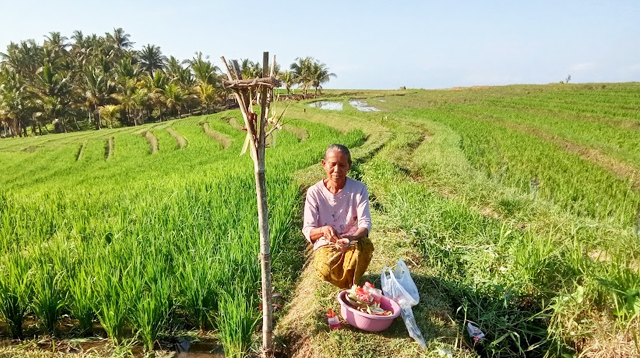LOVELY landscapes and vibrant culture are key features of Bali in combination with a unique blend of Hinduism having evolved over centuries. Balinese Hinduism is deeply intertwined with the island’s agrarian lifestyle, and the people engage in various rituals to seek the blessings of the deities for a bountiful harvest.
Some Balinese Hindu rituals are specifically dedicated to agriculture, shedding light on the spiritual connection between the people, the land, and the divine. Their love and pray are given to their plants in harmony with their physical care through modern farming method.
Tri Hita Karana: Harmony with God, Nature, and Society
Central to Balinese Hindu philosophy is the concept of Tri Hita Karana, which emphasizes the importance of maintaining harmony with God, nature, and society.
In the context of agriculture, this principle guides the Balinese farmers to cultivate their land with respect for the environment and a deep spiritual connection to the divine.
Subak System: An Ancient Irrigation Tradition
The Subak system, recognized as a UNESCO World Heritage cultural landscape, is a traditional Balinese irrigation system that dates back to the 9th century. Balinese farmers, guided by Subak, collaborate to manage water distribution for their rice fields.
The system is not only practical but also reflects the cooperative and interconnected relationship between the people, their agricultural practices, and the spiritual dimensions of life.
Pengiwit: Purifying the Land and the Soul
Starting the planting season, a member of Balinese subak organizations perform the pengiwit (inaugural planting) ceremony. This ritual involves a procession to the God (using oblations) and the lower realm (using caru offerings).
The act of ceremony is meant to cleanse the land area from impurities and invite divine blessings for the plants and prosperous harvest.
Ngusaba: Grand Harvest Celebrations
Ngusaba is a grand festival celebrated in honor of the deities who govern agriculture. This event involves elaborate ceremonies, traditional dances, and offerings expressing gratitude for a successful harvest. Ngusaba is not only a time of celebration but also a reflection of the Balinese people’s commitment to sustainable agricultural practices.
Ngusaba or post-harvest ritual means the ends the planting season and serves as an expression of gratitude for the blessing.
Tumpek Uduh: Blessing the Plants
Tumpek Uduh is a ceremony specifically dedicated to plants and trees. Farmers seek blessings from Lord Sankara, the god of plants, for the well-being of their crops. Offerings are made, prayers are recited, and the farmers express gratitude for the abundance provided by the land.
Balinese Hindu rituals for agriculture are deeply rooted in the island’s cultural and spiritual heritage. The people of Bali view their connection with the land as sacred, and their agricultural practices reflect a profound respect for nature and a harmonious coexistence with the divine. As Bali continues to evolve, these rituals serve as a reminder of the island’s rich cultural tapestry and the importance of maintaining a spiritual connection with the land that sustains them.
This agrarian special celebration is held once in 210 days, falling on Saniscara (Saturday) Kliwon Wariga (25 days before Galungan). Tumpek Uduh is also called Tumpek Bubuh or Tumpek Pengatag or Tumpek Pengarah. The offerings and worship on Tumpek Bubuh are aimed at the manifestation of God as the Lord Sankara, ruler of plants.
Meanwhile, their paddy plants have different series of rituals. It is treated like human beings. For instance, local farmers will choose auspicious day to prepare their seedlings and plant them. After that, there are ritual for inauguration (newasanin), post-transplantation recovery (masembuhan), pest and disease control (ngelepeh), before flowering(miseh) and ripening (mabiyukukung). Chiefly before flowering, farmers will prepare ritual containing sour fruits as it is analogized to craving.










